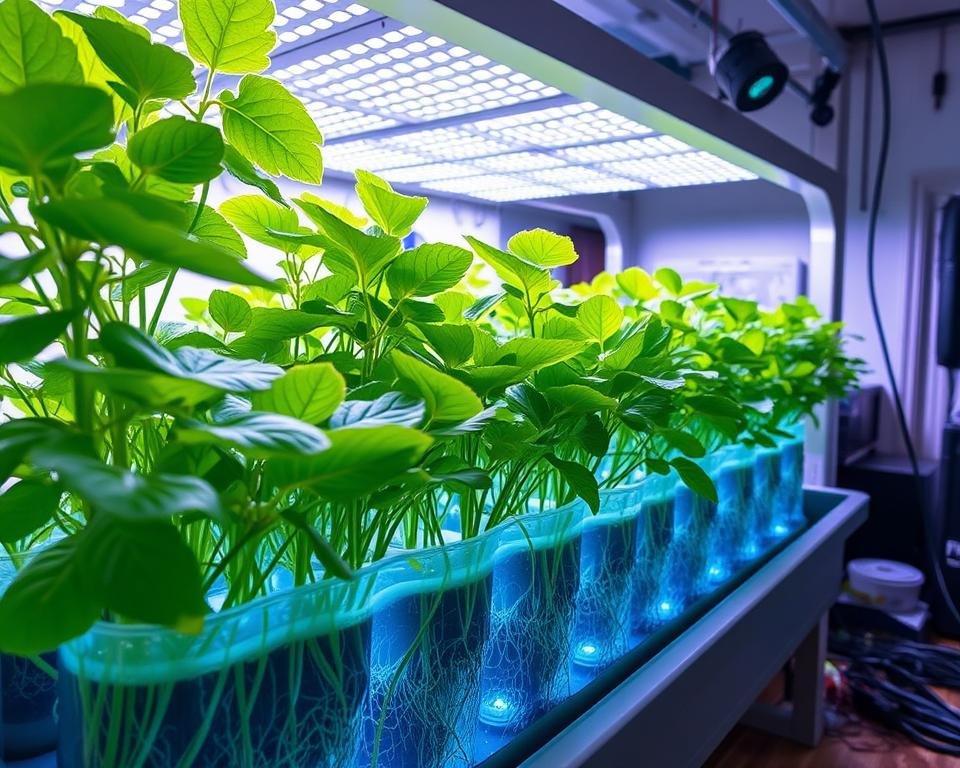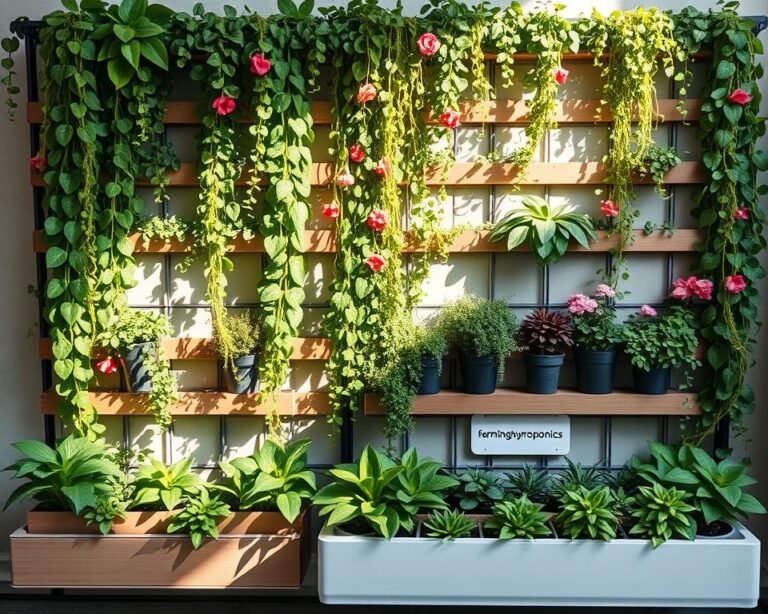Interviews with Hydroponic Experts: Powerful Insights for Better Growing
Imagine turning a small part of your home into a lush green space. Here, plants grow faster, healthier, and more than ever before. The world of hydroponics makes this possible. As the global hydroponics market grows, new techniques are changing how we grow.
In our exclusive interviews with Hydroponic Experts, we explore the latest strategies in hydroponics. These experts share their years of experience, helping you grow like a pro. Whether you’re new or experienced, their advice will take your growing to the next level.
Key Takeaways
- Expert interviews provide crucial insights for hydroponic success
- Hydroponics offers unprecedented growth potential with minimal resources
- Smart technology is revolutionizing hydroponic growing methods
- Precise environmental control is critical for optimal plant development
- Continuous learning is key to mastering hydroponic techniques
The Evolution of Hydroponic Growing: From History to Modern Practice
Hydroponic farming is a new way to grow food that doesn’t use soil. It’s a big change from old ways of farming. This method helps grow crops in a way that’s good for the planet.
Hydroponics has been around for a long time. Scientists have been studying how plants grow in water for centuries. Francis Bacon wrote about growing plants in water in his book Sylva Sylvarum in 1627. This was the start of new ideas in farming.
Origins of Hydroponics: Scientific Breakthroughs
Early farmers found that growing plants in water had many benefits:
- It got rid of problems with soil
- It made it easy to control what plants eat
- It let plants grow in places where soil doesn’t grow well
Wake Island: A Commercial Milestone
Wake Island was a big moment in hydroponics. It was the first place where growing plants in water was done on a big scale. People grew vegetables in a place where soil doesn’t grow well. This showed that hydroponics could work in tough places.
Modern Applications in Commercial Growing
Today, farmers use new technology to grow more food. Hydroponics has grown a lot. It helps solve big problems in farming:
| Application | Impact |
|---|---|
| Urban Agriculture | Allows growing food in small spaces |
| Resource Efficiency | Uses up to 90% less water |
| Year-Round Growing | Means plants can grow all year, not just in certain seasons |
“Hydroponics represents the future of sustainable agriculture, transforming how we think about food production.” – Dr. Sarah Martinez, Agricultural Innovation Specialist
Hydroponic farming is still growing and changing. It’s bringing new hope for food and farming that’s good for the planet.
Understanding the Fundamentals of Hydroponic Systems
Hydroponic systems are a new way to grow plants indoors. They let you grow crops without soil, using water full of nutrients instead.
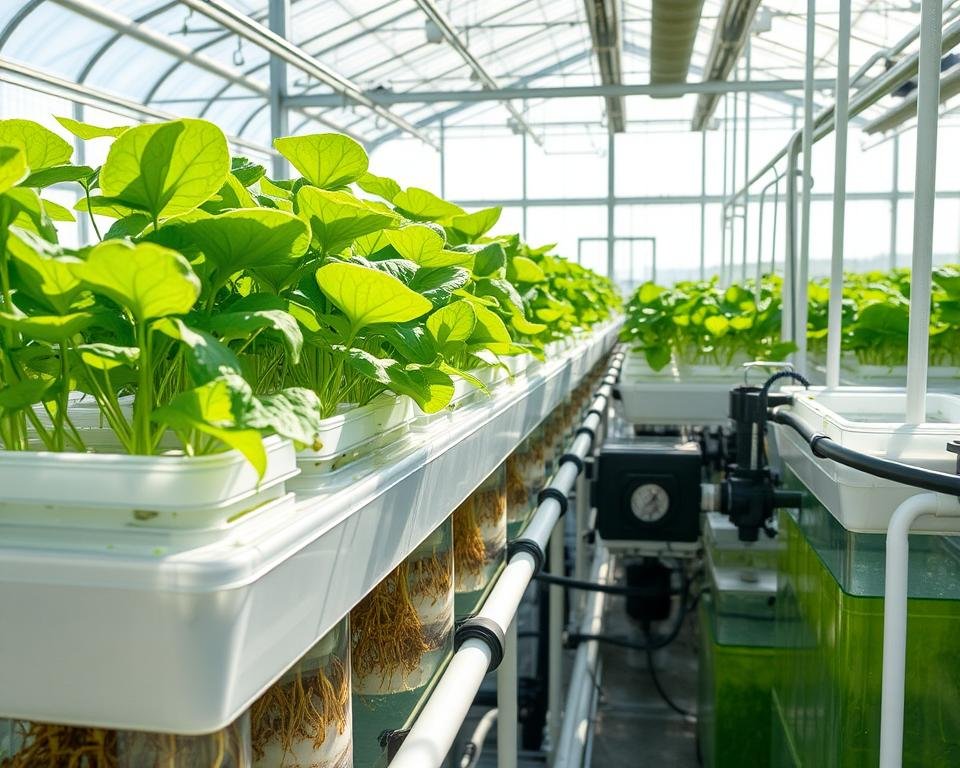
- Wick Technique
- Ebb and Flow Technique
- Nutrient Film Technique (NFT)
- Water Culture Technique
- Drip Technique
- Aeroponic Method
To grow plants well with hydroponics, you need to know a few things. Plastic is often used because it’s cheap and flexible.
*”Hydroponics transforms agricultural possibilities by reducing water consumption and maximizing space efficiency.”*
Important things to think about for hydroponics include:
- Managing the nutrient solution
- Keeping an eye on pH levels
- Light and temperature control
| System Type | Water Efficiency | Space Requirements |
|---|---|---|
| Wick System | Low | Small |
| NFT System | High | Medium |
| Aeroponic System | Very High | Compact |
Using the right nutrients and keeping things clean helps plants grow well. This way, you can make a great place for plants to thrive.
Interviews with Hydroponic Experts: Direct Insights from Industry Leaders
Exploring hydroponic farming opens up a world of innovation and expertise. Top hydroponic entrepreneurs are changing how we grow food, sharing valuable tips for all growers. Their expert tips for hydroponic farming can change how you grow plants without soil.
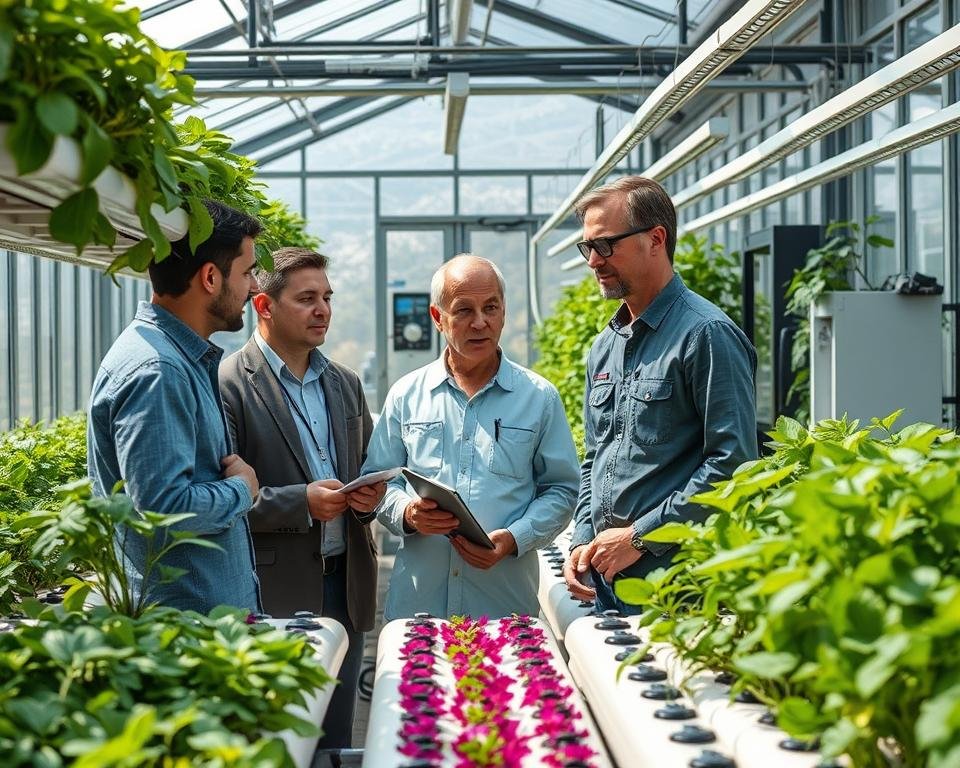
Industry leaders offer crucial views on modern farming. Their combined experience guides you to success in hydroponic growing.
Expert Perspectives on System Selection
Choosing the right hydroponic system is key to success. Experts say to consider these important factors:
- Crop type and growth needs
- Space and environmental conditions
- Budget and future investment
- System scalability
Professional Tips for Nutrient Management
Managing nutrients is vital for hydroponic success. Experts stress the need for:
- Accurate nutrient solution making
- Regular water quality checks
- Knowing plant nutritional needs
- Consistent pH monitoring
Guidance on Environmental Control
Creating the perfect growing space needs careful planning. Top hydroponic leaders share key insights for maintaining ideal conditions:
| Environmental Factor | Optimal Range | Monitoring Technique |
|---|---|---|
| Temperature | 68-75°F | Digital thermometers |
| Humidity | 50-70% | Hygrometer |
| Light Exposure | 12-16 hours | Automated lighting systems |
“Success in hydroponics comes from understanding your plants’ unique requirements and creating the perfect environment for growth.” – Rafael Cortez, Ocean State Hydroponics
By using these expert strategies, you’ll be on your way to a successful hydroponic system. It will help you grow more and sustainably.
Essential Steps for Optimizing Hydroponic Production
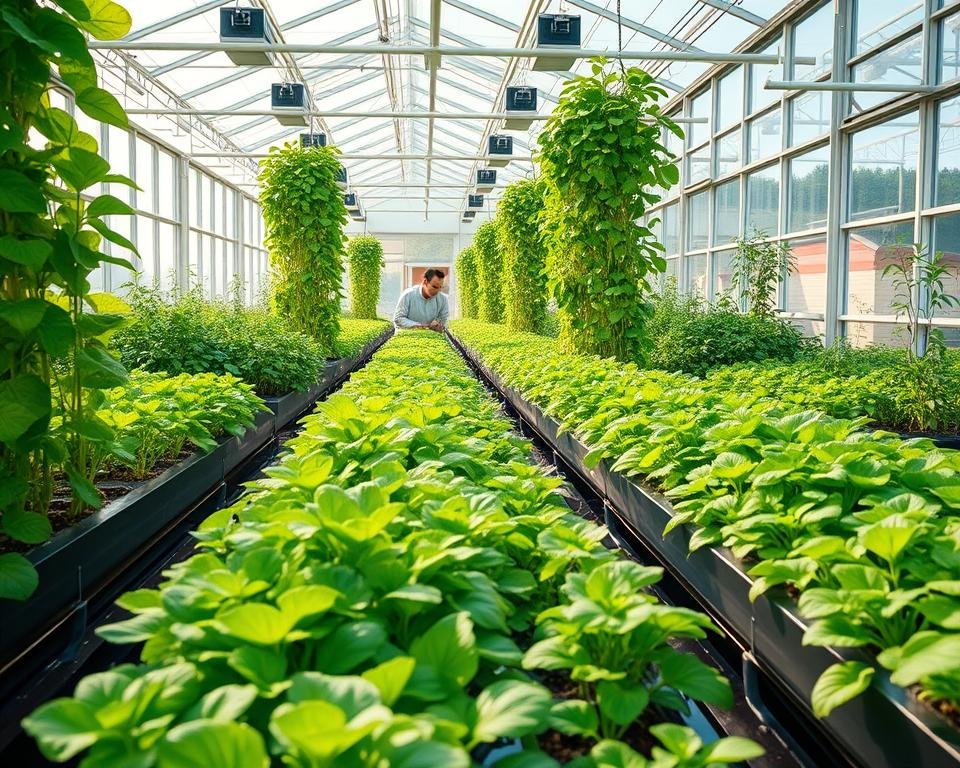
Mastering hydroponic farming needs careful planning and attention to detail. To grow successful crops, it’s important to know key optimization techniques. These can change how you grow plants.
“Success in hydroponics techniques is not about perfection, but about continuous learning and adaptation.”
Here are important optimization strategies for hydroponic farming:
- Embrace Continuous Learning
- Never think you know everything about hydroponic techniques
- Stay open to new methods and technologies
- Focus on Specific Crops
- Start with 2-3 hydroponic crops
- Learn a lot about specific plant varieties
- Maintain Rigorous Cleanliness
- Follow strict sanitation protocols
- Stop diseases from spreading
Keeping track of your progress is key in hydroponic farming. Keep a detailed journal of:
- Nutrient solution changes
- pH level changes
- Plant growth stages
- Environmental conditions
For the best hydroponic production, keep pH levels between 5.5 and 6.5. Make sure nutrient levels are right. Also, keep water temperatures between 65°F and 72°F. These things really affect how well your crops grow and how good they taste.
“Knowledge shared among experienced growers is the most valuable nutrient in hydroponic farming.”
Remember, patience and always learning are your biggest strengths in hydroponic farming. They help you develop successful strategies.
Advanced Techniques for Water and Nutrient Management
Mastering water and nutrient management is key for successful hydroponic farming. Knowing how to optimize these elements can greatly boost crop yields and system performance.
Managing pH Levels and Nutrient Solutions
In hydroponic farming, pH levels are crucial for plant growth. The best pH range for nutrient absorption is between 5.5 and 6.5. At this range, plants absorb essential minerals well.
- Monitor pH levels consistently
- Use calibrated pH testing tools
- Adjust nutrient solutions promptly
Water Quality Control Methods
Water quality is vital for hydroponic farming success. Keeping dissolved oxygen levels between 5-7 parts per million is key for strong root growth.
| Parameter | Optimal Range | Impact |
|---|---|---|
| Dissolved Oxygen | 5-7 ppm | Root Health |
| pH Level | 5.5-6.5 | Nutrient Absorption |
| ORP | 200-350 mV | System Efficiency |
Disease Prevention Strategies
Preventing disease is crucial in soilless cultivation. Use these strategies to keep your hydroponic environment healthy:
- Regular system sanitization
- Implement air circulation
- Use high-quality water filtration
- Monitor plant health continuously
“In hydroponic farming, prevention is always better than cure. Consistent monitoring and strategic interventions are key to successful crop production.” – Hydroponic Expert
By applying these advanced techniques, you can improve your hydroponic system’s performance. This reduces risks and boosts crop yields.
Overcoming Common Hydroponic Growing Challenges
Hydroponic gardening comes with its own set of challenges. Hydroponic professionals say that growing well needs quick action and knowing how systems work.
Hydroponic growers face big challenges that can hurt crop growth:
- Root Disease Management: Stopping and finding root health problems
- Nutrient Solution Optimization
- Environmental Control
- Pest Prevention Strategies
It’s key to know the signs of root disease. Look out for these signs:
- Leaf yellowing
- Wilting even with enough water
- Discolored roots (brown or black)
- Stunted growth
“Prevention is always better than cure in hydroponic systems.” – Hydroponic Gardening Expert
To beat challenges, keep water quality right, watch your system closely, and make the best growing conditions. By learning about your system’s needs, you can avoid problems and grow more.
Success in hydroponic gardening means always learning and adjusting. Keep up with new info, watch your system, and be ready to change things fast.
Conclusion: Implementing Expert Advice for Success
Starting your hydroponic gardening journey? Remember, success comes from learning and using expert tips. Hydroponic entrepreneurs succeed through hard work, creativity, and a spirit of experimentation. By following the advice of industry leaders, you can improve your growing skills.
With hydroponic gardening expert insights, you’ll see hydroponics as a sustainable food solution. It uses up to 90% less water than traditional farming. Plus, it grows crops efficiently.
Success in hydroponics means facing challenges head-on. The setup might seem tough at first, but the benefits are huge. You’ll grow fresh, healthy food all year, save water, and help your community.
Hydroponics is more than growing plants. It’s about changing how we farm. Stay curious, connect with others, and keep learning. This way, you’ll excel in this exciting field of agriculture.

